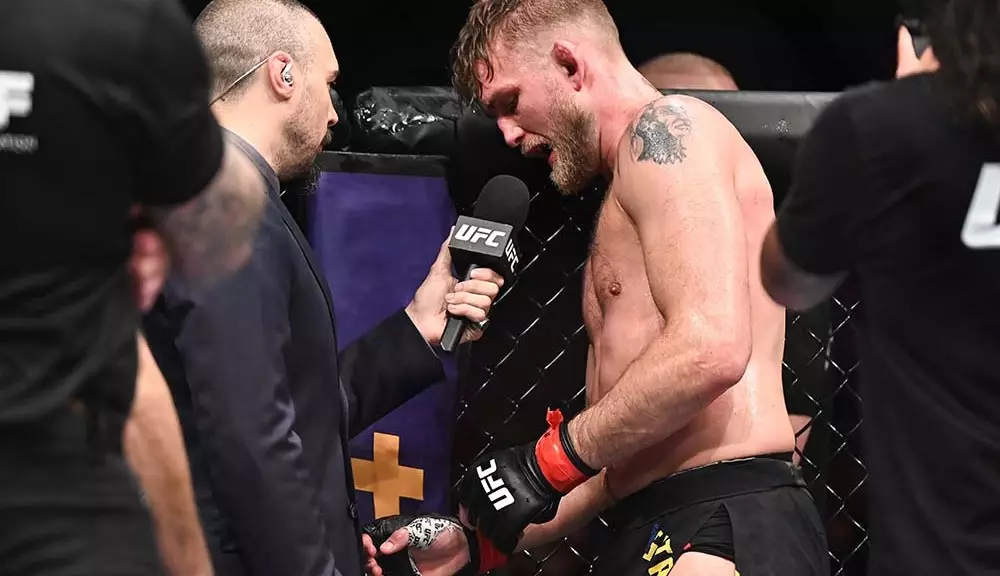In the world of Mixed Martial Arts (MMA), few narratives resonate as profoundly as that of a fighter reconciling with the twilight of their career. Alexander Gustafsson, a well-known figure in the UFC, stands at such a crossroads. His identity as a fighter has evolved, shaped by experiences in the octagon and a reflection on his journey. As Gustafsson steps into a new chapter of his life, the insights he shares reveal not only his relationship with fighting but also the broader landscape of professional athletics.
Gustafsson’s record, standing at 18-8, paints a picture of a valiant competitor who pushed the boundaries of his capabilities. Having faced titans like Jon Jones and Daniel Cormier, his fights were not merely bouts; they were chapters in an ongoing saga of ambition and resilience. Often regarded as one of the greatest fighters to have never captured a title, his journey prompts a deeper analysis of success and fulfillment in sports. What does it mean to leave an indelible mark on a sport, even without a championship belt to signify that achievement?
The echoes of his battles remind observers that the sport is defined not merely by victories but also by the heart and spirit demonstrated in competition. Gustafsson is emblematic of the athlete who symbolizes determination and grit, making his way toward recognition, even without the coveted accolades. Yet, despite the pride inherent in his achievements, there exists a stark realization that the time has come to transition outside the UFC spotlight.
The decision to step back is rarely simple, especially when the fighters have invested years honing their bodies and minds for combat. Gustafsson’s openness in stating he feels he is “not in [his] top game anymore” resonates with many athletes who must confront the dual specters of aging and evolving capabilities. At 38, Gustafsson acknowledges the shifting dynamics within his training and competitive readiness. This insight stands as recognition of the importance of self-awareness—a critical attribute for any athlete seeking longevity and health beyond their professional years.
He mentions that he feels the “real fire” and “hunger” are dwindling, underscoring an essential truth: motivation can wane as physical abilities recede. This sense of realism provides an important reminder that competition demands a particular level of drive and energy—qualities that he feels have waned over time. By confronting these issues, Gustafsson exemplifies a new paradigm in officiating career longevity. It reflects a larger conversation about mental fortitude, conditioning, and the acknowledgment of growing older in a domain that rewards youth and vigor.
While Gustafsson clearly delineates his position regarding the UFC, he isn’t retiring from fighting altogether, evidenced by his recent contract with the Global Fight League. This transition is significant; it offers a platform for fighters who may not fit the conventional mold of elite UFC contenders yet still harbor aspirations of competitive engagement. For Gustafsson, this represents an opportunity to redefine what it means to compete as he moves forward.
In his own words, “I have a couple of fights left in me,” suggesting a desire to remain connected to the sport he loves, even if it means reconfiguring his place within it. This shift may not deliver the same pressures and expectations typical of the UFC but offers a fresh space for Gustafsson to engage with a new generation of fighters, all while sharing his knowledge and experience.
Ultimately, Gustafsson’s reflections illustrate a journey of transformation and acceptance. The decision to pursue his fighting career outside the confines of the UFC shows an understanding that success is not monolithic. For athletes, evaluating personal achievement often requires an honest appraisal of one’s strengths and weaknesses. Gustafsson’s decision is marked by clarity and respect for the sport—it reveals a commitment to self-care and acknowledging when it’s time for change.
As Gustafsson prepares to navigate this new landscape, he isn’t merely stepping down; instead, he’s stepping into a landscape where he can redefine himself. The future remains uncertain, but for an athlete of his caliber, the path forward is indeed promising. The legacy he leaves behind in the UFC will serve as a foundation for whatever comes next, reminding him and others that every conclusion is simply a prelude to a new adventure in the ever-evolving world of sports.

